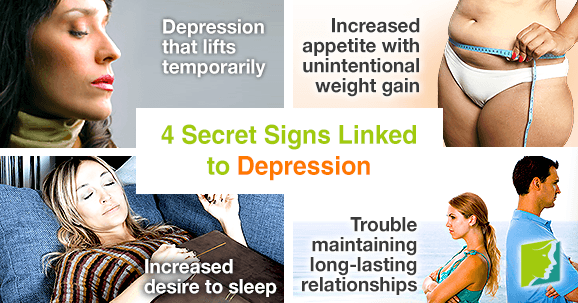Negative stereotypes about depression and its sufferers are pervasive in society. The withdrawn, can't-get-out-of-bed, constantly glum-looking caricature tends to be associated with traditional depression, and this can make it harder for people with atypical or high-functioning depression to recognize the illness in themselves and be taken seriously by others. Read on for more information about the secret signs that are linked to depression.
What Is Depression?
A feeling of sadness and depression is a normal and healthy response to stressful or tragic life events, but sometimes these negative feelings become chronic and leave the sufferer with a feeling of isolation and hopelessness - this is depression: In these situations it is impossible for the sufferer to simply "snap out of it". Depression can often leave an individual feeling exhausted after completing the simplest of tasks. The most common form of depression comes with symptoms that are commonly associated with the disorder which makes it relatively easy to notice; these include insomnia, withdrawal from social contact, lack of motivation, or loss of appetite and weight.
However, there are other types of depression, such as atypical depression, which can often be interpreted as laziness, or high-functioning depression, where the sufferer can function normally at work, at home, and in social situations, but is nevertheless overwhelmed by negative emotions. Keep reading for more information about signs that could indicate depression.
How Do I Spot Depression?
Any type of depression can leave a victim feeling sad and prevent him or her from enjoying life, but symptoms can differ depending on the form of depression. Atypical depression is more difficult to spot than melancholic depression, so it can end up being more isolating as the sufferer is less likely to receive sympathy or help. Signs to look out for are:
Depression that lifts temporarily
When good news is received or positive events occur, depression may seem to disappear, but it will often return later when euphoria has subsided. If you find it difficult to keep your mood high in neutral situations, then it might be worthwhile talking to a doctor and explaining your concerns about atypical depression.
Increased appetite with unintentional weight gain
A lack of appetite or weight loss is commonly associated with depression. However, those whose depression takes the form of overeating, are more commonly misdiagnosed as simply lacking willpower. If you find yourself overeating in response to emotional issues, this could be an indication of depression.
Increased desire to sleep
When a person regularly sleeps for more than 10 hours a day they are often just deemed as lazy, but oversleeping could be an indication of depression or another illness. Oversleeping however, is a problem in itself that can have negative physical effects on the body.
Trouble maintaining long-lasting relationships
Sensitivity to rejection or criticism can affect your relationships, social life, or job. Oversensitivity can be a response to internal negative emotions, so if you find it is affecting your relationships, it could be indicative of a psychological condition.
It is tempting to think of yourself or others as depression-free if usual stereotypes are not meet or you manage to function on a daily basis regardless. However, internal turmoil can still be damaging to physical and psychological well-being even if everyday life is bearable. Keep an eye out for the unusual signs that are linked to depression as they might help you or a loved one recognize depression before the condition completely takes over.
Sources
- Depression Alliance. (2014). Information. Retrieved August 7, 2014, from http://www.depressionalliance.org/information/
- National Health Service UK. (2014). Clinical depression-Symptoms. Retrieved August 7, 2014, from http://www.nhs.uk/Conditions/Depression/Pages/Symptoms.aspx
- Singh, T. & Williams, K. (2006). Atypical Depression. Psychiatry (Edgmont), 3(4), 33-39. Retrieved from http://www.ncbi.nlm.nih.gov/pmc/articles/PMC2990566/




